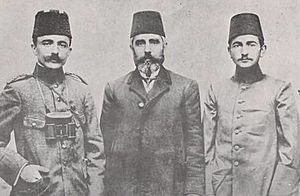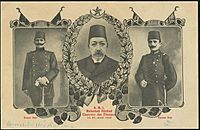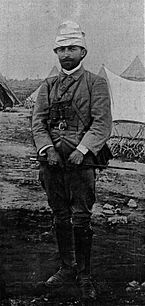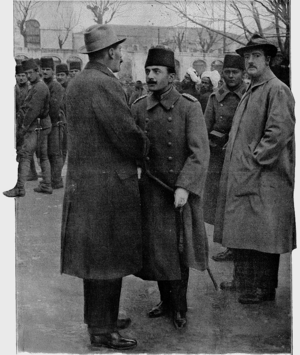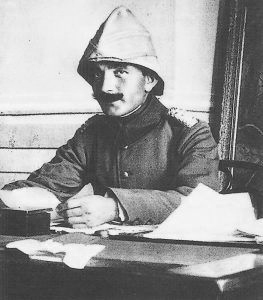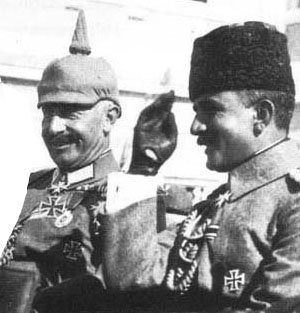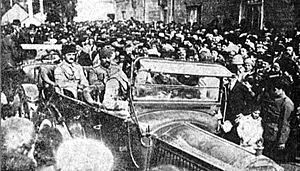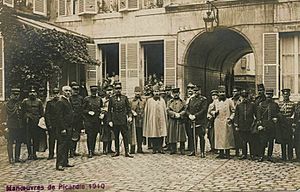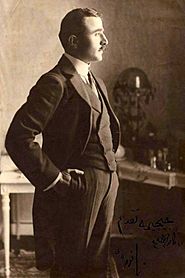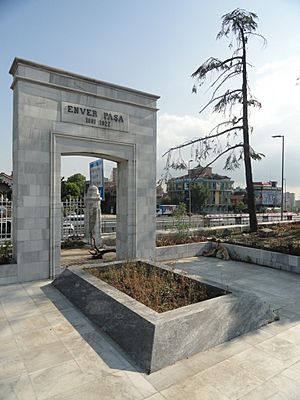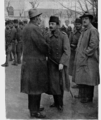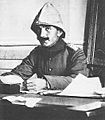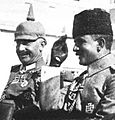Enver Pasha facts for kids
Quick facts for kids
İsmail Enver
Pasha
|
|
|---|---|
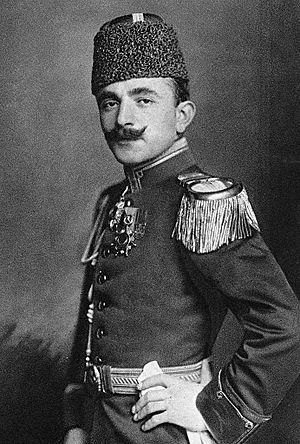
Enver Bey in 1911
|
|
| Minister of War | |
| In office 3 January 1914 – 13 October 1918 |
|
| Prime Minister | Mehmed Talaat Pasha Said Halim Pasha |
| Preceded by | Ahmet Izzet Pasha |
| Succeeded by | Ahmet Izzet Pasha |
| Chief of the General Staff | |
| In office 8 January 1914 – 13 October 1918 |
|
| Preceded by | Mehmed Hâdî Pasha |
| Succeeded by | Ahmed Izzet Pasha |
| Deputy commander-in-chief | |
| In office 8 January 1914 – 10 August 1918 |
|
| Monarch | Mehmed V Mehmed VI |
| Chief of staff of the commander-in-chief | |
| In office 10 August 1918 – 13 October 1918 |
|
| Monarch | Mehmed VI |
| Personal details | |
| Born | 22 November 1881 Constantinople, Ottoman Empire (present-day Istanbul, Turkey) |
| Died | 4 August 1922 (aged 40) Bukharan People's Soviet Republic (present-day Tajikistan) |
| Resting place | Monument of Liberty, Istanbul, Turkey 41°04′05″N 28°58′55″E / 41.06814°N 28.982041°E |
| Nationality | Ottoman |
| Political party | Union and Progress Party |
| Spouse | Naciye Sultan |
| Children | Mahpeyker Hanımsultan Türkan Hanımsultan Sultanzade Ali Bey |
| Alma mater | Army War College (1903) |
| Signature | |
| Military service | |
| Branch/service | Ottoman Army |
| Years of service | 1903–1918 |
| Rank | Mirliva and the de facto Commander-in-Chief |
| Commands | Army of Islam Yildirim Army Group Third Army |
| Battles/wars |
|
İsmail Enver, known as Enver Pasha (born November 22, 1881 – died August 4, 1922), was an important Ottoman military officer and a leader in the Ottoman Empire. He was one of the "Three Pashas" who held great power in the government. The other two were Talaat Pasha and Cemal Pasha.
Enver was a member of the Committee of Union and Progress (CUP). This group, also known as the Young Turks, wanted to change the absolute rule of Sultan Abdul Hamid II. He helped lead the Young Turk Revolution in 1908. This revolution brought back the Constitution and a parliamentary democracy to the Ottoman Empire. Enver and Ahmed Niyazi were seen as heroes of this revolution.
However, the Empire faced many problems, like the 31 March Incident and the Balkan Wars. These events made Enver and the CUP lose faith in having many political parties. After the 1913 coup, the CUP took direct control. Enver Pasha became the Minister of War in 1914 and took charge of the Ottoman army. Talaat Pasha led the civilian government.
As War Minister and the main military leader, Enver Pasha was very powerful. He led a difficult attack on Russian forces in the Battle of Sarikamish. After this defeat, he blamed Armenian soldiers. His actions during this time led to great suffering and loss of life for many people. After the Ottoman Empire lost World War I, Enver and other CUP leaders left the country. An Ottoman court later blamed him for leading the Empire into World War I and for the suffering of many people. He was sentenced to death while he was away. Enver went to Central Asia, where he was killed while leading a rebellion called the Basmachi movement against the Bolsheviks. In 1996, his remains were brought back to Turkey and reburied.
Contents
Early Life and Military Career
Enver was born in Constantinople (today's Istanbul) on November 22, 1881. His father, Ahmed, worked as a bridge-keeper or a public prosecutor. His mother, Ayşe Dilara, was of Tatar background. Enver had two younger brothers, Nuri and Mehmed Kamil, and two younger sisters, Hasene and Mediha. His uncle was Halil Pasha.
When he was six, Enver moved to Monastir (now Bitola) and went to primary school. He studied at various military schools and graduated from the Ottoman Military Academy in 1902. From 1903 to 1908, he learned about guerrilla warfare against Bulgarians. This made him believe that the Ottoman military needed reforms.
Rise to Power
Joining the Committee of Union and Progress
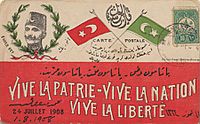
Enver joined the Ottoman Freedom Society (OFS) with help from his uncle, Halil Kut. The OFS later joined with the Committee of Union and Progress (CUP), led by Ahmed Rıza. The CUP gained influence in the Third Army through Enver. In 1906, Enver started a CUP group in Monastir and worked with officer Kâzım Karabekir. Enver became a key figure in the CUP's Monastir branch. He brought other officers like Ahmet Niyazi bey and Eyüp Sabri into the CUP.
Enver and other Young Turk members became interested in the ideas of Gustave Le Bon. Enver thought that a group of leaders could be as dangerous as a single ruler. As the CUP changed, Enver gained more importance in the Young Turk movement.
In Ohri (now Ohrid), an armed group called the Special Muslim Organisation (SMO) was formed in 1907. This group protected local Muslims and fought other armed groups. Enver and Sabri recruited the SMO and made it the Ohri branch of the CUP. Enver was given the title "CUP Inspector General of Internal Organisation."
The Young Turk Revolution
On July 3, 1908, Niyazi protested against Sultan Abdul Hamid II's rule. He fled to the mountains and started the Young Turk Revolution. He called for the constitution of 1876 to be brought back. Enver in Tikveş and other officers also went to the mountains and formed guerrilla groups. They played on people's fears of foreign interference to gain local support.
Enver led a group of volunteers and soldiers who had left the army. He allowed a soldier who had been a bandit to join his group. During the revolution, Enver's and Niyazi's groups were mostly made up of Muslim fighters, many of them Albanian. Enver spoke both Albanian and Turkish, which helped him communicate with locals. He stayed in the homes of important people who respected him.
On July 11, 1908, Enver sent a message to the Inspector General. He demanded that Sultan Abdul Hamid II free arrested CUP members within 48 hours. He warned of consequences if his demand was not met. As the revolution grew, more officers joined. Enver and Niyazi got officials and civilians to send many requests to the Ottoman palace. Facing a difficult situation, Sultan Abdul Hamid II brought back the constitution on July 24.
After the Revolution
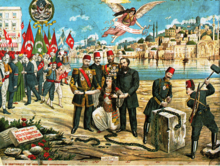
After the revolution, Niyazi and Enver became very popular. Their pictures were put on postcards and spread throughout the Ottoman Empire. Children in Constantinople even played with masks of the revolutionaries. They were called "heroes of freedom" and represented cooperation between Albanians and Turks.
A song called the "March of the Deputies" was created to celebrate the new parliament. It mentioned Niyazi and Enver, saying, "Long live Niyazi, long live Enver." The Ottoman newspaper Volkan also praised them.
Enver became more important in the Ottoman military. By 1909, he was a military representative in Berlin, Germany. He made friends with high-ranking German officials and admired German culture and military power. He invited German officers to help improve the Ottoman Army. In April 1909, Enver helped put down a counter-revolution called the 31 March Incident. This led to Sultan Abdul Hamid II being replaced by his brother Mehmed V. The CUP's power became stronger. Enver was a member of the CUP central committee from 1908 to 1918.
Italo-Turkish War
In 1911, Italy invaded the Ottoman province of Tripolitania (modern Libya). This started the Italo-Turkish War. Enver decided to help defend the province. He left Berlin for Libya and took command, gathering 20,000 troops. However, the Balkan Wars began, and Enver and other Ottoman generals had to return to Constantinople. This allowed Italy to take control of Libya. In 1912, Enver was promoted to lieutenant colonel for his role in the war.
Losing Libya made the CUP less popular. They lost power after the 1912 elections. The Freedom and Accord Party took over.
Balkan Wars and 1913 Coup
In October 1912, the First Balkan War began. The Ottoman armies suffered big defeats. This weakened the government. In January 1913, Enver and CUP leader Mehmed Talaat led a coup. They took power back for the CUP. This created a group of three powerful leaders called the "Three Pashas": Enver, Talaat, and Ahmed Cemal Pasha.
Turkey then left the peace talks in London and continued the First Balkan War. However, the war was still lost. The Ottoman Empire gave up almost all its land in the Balkans. Later, the Grand Vizier Mahmud Shevket Pasha was killed. This allowed the CUP to take full control of the empire.
In June 1913, the Second Balkan War started between the Balkan Allies. Enver Bey used this chance to lead an army into Eastern Thrace. He took back Adrianople (Edirne) from the Bulgarians. Because of this, some Turks call Enver the "conqueror of Edirne."
In 1914, he became Minister of War. He also married Princess Emine Naciye Sultan (1898–1957), who was the daughter of Prince Süleyman. This made him part of the royal family.
World War I
Enver Pasha spoke German well. He, along with Talaat and Halil Bey, helped create the Ottoman-German Alliance. They hoped for a quick victory in the war that would help the Ottoman Empire. Without telling the government, Enver allowed two German warships, SMS Goeben and SMS Breslau, to enter the Dardanelles. This helped Germany, even though France and Russia tried to keep the Ottoman Empire out of the war.
On October 29, Admiral Souchon, who was now leading the Ottoman navy, took the German ships and Ottoman warships into the Black Sea. They bombed Russian ports. Russia declared war on the Ottoman Empire on November 2, and Britain followed on November 5. Most Ottoman leaders were against joining the war so quickly, but Enver Pasha believed it was the right decision.
Enver was not always an effective War Minister. German generals like Otto Liman von Sanders often had to help the Ottoman government. Germany also sent military supplies and fuel. On October 31, 1914, Enver ordered all men of military age to report for duty. So many men showed up that the offices could not handle them. This caused long delays and ruined the crop harvest that year.
Battle of Sarikamish, 1914
Enver Pasha took command of the Ottoman forces fighting the Russians in the Caucasus region. He wanted to surround the Russians, push them out of Ottoman land, and take back Kars and Batumi. Enver saw himself as a great military leader, but the German military adviser, Otto Liman von Sanders, thought he was not good at it.
Enver ordered a complicated attack on the Russians. He personally led the Third Army. However, his army was badly defeated at the Battle of Sarikamish in December 1914 – January 1915. His plan looked good on paper, but he ignored the harsh conditions, like the cold weather and difficult land. Enver's army of 118,000 men was defeated by 80,000 Russian soldiers. During the retreat, tens of thousands of Turkish soldiers died. This was the worst Ottoman defeat in World War I.
When he returned to Constantinople, Enver Pasha blamed his failure on his Armenian soldiers. Even though an Armenian had saved his life in January 1915, Enver Pasha later started the forced movement and killings of Armenians.
Commanding Forces Near the Capital, 1915–1918
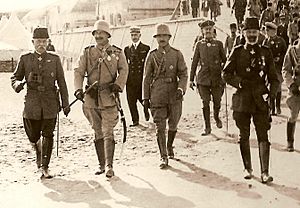
After his defeat at Sarıkamısh, Enver went back to Istanbul. He took command of the Turkish forces around the capital. He was sure that the capital was safe from any attacks by the Allies. The British and French planned to attack the Dardanelles to try and knock the Ottomans out of the war. A large Allied fleet attacked the Dardanelles on March 18, 1915. This attack was a disaster for the Allies, and they lost several ships.
Because of this, Enver gave command to Liman von Sanders. Liman von Sanders successfully defended Gallipoli. Enver then left to deal with problems on the Caucasus Front. Later, after many towns on the peninsula were destroyed by Allied bombing, Enver suggested creating a camp for French and British citizens in the empire. Henry Morgenthau, the American ambassador, convinced Enver not to do this.
Yildirim Army Group
Enver wanted the Falkenhayn’s Yildirim Army Group to take back Baghdad. Baghdad had recently been captured by Maude. This plan was almost impossible due to problems with supplies. Turkish soldiers were leaving the army. When Enver visited Beirut in June 1917, soldiers were not allowed near his route because people feared he might be attacked. A lack of trains meant that troops often had to get off in Damascus and walk south.
Army of Islam
In 1917, the Russian Revolution caused the Russian army in the Caucasus to fall apart. At the same time, the CUP made friends with the Bolsheviks by signing a treaty in 1918. Enver saw a chance for victory when Russia left the Caucasus. He ordered a new military force called the Army of Islam. This army would not have German officers.
Enver's Army of Islam went through Azerbaijan, avoiding Georgia. The Third Army also moved towards the First Republic of Armenia. The Ottoman advance was stopped at the Battle of Sardarabad.
The Army of Islam, led by Nuri Pasha, attacked British, Australian, New Zealand, and Canadian troops at Baku. The British general ordered the city to be left on September 14. When the Army of Islam and their allies entered Baku on September 15, many Armenian civilians were killed.
However, after the Armistice of Mudros was signed on October 30, Ottoman troops had to leave. These gains in the Caucasus did not change the overall war much. But they did ensure that Baku remained part of Azerbaijan.
End of War and Exile
When the Ottoman Empire faced defeat, the Sultan removed Enver from his War Minister job on October 4, 1918. The rest of Talaat Pasha's government resigned on October 14. On October 30, 1918, the Ottoman Empire surrendered by signing the Armistice of Mudros. Two days later, the "Three Pashas" all left the country. On January 1, 1919, the new government removed Enver Pasha from the army. He was tried while absent and blamed for "leading the country into war without a good reason, forcing Armenians to leave, and leaving the country without permission." He was sentenced to death.
Enver first went to Germany. In April 1919, Enver went to Moscow. He wanted to work with the new Soviet Russian government against the British. He was welcomed there and met with Bolshevik leaders like Lenin. He tried to support the Turkish national movement and wrote to Mustafa Kemal. He promised not to interfere with the movement in Anatolia. From September 1 to 8, 1920, he was in Baku for a meeting, representing several North African countries.
Relations with Mustafa Kemal
Much has been written about the difficult relationship between Enver and Mustafa Kemal. Both men were very important in Turkish history. They both came from the Balkans and served together before World War I. Enver was older than Mustafa Kemal. Enver did not like Mustafa Kemal's cautious approach to the CUP's plans. He saw him as a serious competitor.
Mustafa Kemal (later known as Atatürk) thought Enver was dangerous and might lead the country to ruin. He criticized Enver for his decisions and for involving the Ottoman Empire in World War I. After the war ended in 1918, Mustafa Kemal led the Turkish resistance against invading forces. Enver wanted to return from exile and join the fight, but the government in Ankara, led by Mustafa Kemal, stopped him.
Pan-Turkism and Death, 1921–22
On July 30, 1921, during the Turkish War of Independence, Enver decided to return to Anatolia. He went to Batum to be near the new border. However, Mustafa Kemal did not want him among the Turkish revolutionaries. Mustafa Kemal had stopped being friends with Enver Pasha and the CUP as early as 1912. He did not agree with Enver Pasha's ideas of pan-Turkic unity.
Enver Pasha changed his plans and went to Moscow. There, he gained the trust of the Soviet leaders. In November 1921, Lenin sent him to Bukhara to help stop the Basmachi Revolt against the local pro-Moscow government. But instead, Enver secretly contacted some of the rebel leaders. He and a few followers joined the Basmachi side. His goal was to unite the many Basmachi groups under his command. He wanted to fight the Bolsheviks and achieve his pan-Turkic dreams. After some successful military actions, he became the rebels' supreme commander. He turned their disorganized forces into a small but well-trained army.
On August 4, 1922, Enver allowed his troops to celebrate a holiday. He kept only 30 guards at his headquarters near the village of Ab-i-Derya. A Red Army cavalry group, led by Yakov Melkumov, launched a surprise attack. Enver and about 25 of his men rode their horses and charged the approaching troops. Enver was killed by machine-gun fire.
Enver's body was buried near Ab-i-Derya in Tajikistan. In 1996, his remains were brought to Turkey. He was reburied at the Abide-i Hürriyet cemetery in Şişli, Istanbul. This reburial happened on August 4, the anniversary of his death. Enver Pasha is still a debated figure in Turkey. This is because he and Atatürk had a personal rivalry. But when his body arrived in Turkey, President Süleyman Demirel gave a speech. He recognized Enver's contributions to Turkish nationalism. In 2020, Turkish President Recep Erdoğan praised Enver Pasha's role during World War I. This happened during an Azeri victory parade in Baku.
Family Life
After Enver's death, three of his four siblings took the surname "Killigil." These were Nuri (1889–1949), Mehmed Kamil (1900–62), and Hasene Hanım. This happened after the 1934 Surname Law in Turkey.
Enver's sister Hasene Hanım married Nazım Bey. Nazım Bey was an aide to Abdul Hamid II. Hasene and Nazım had a son named Faruk Kenç (1910–2000). He later became a famous Turkish film director.
Enver's other sister, Mediha Hanım (later Mediha Orbay; 1895–1983), married Kâzım Orbay. He was a well-known Turkish general and politician.
Marriage
Around 1908, Enver Pasha was talked about for a possible romance. However, his marriage was arranged for political reasons. The grand vizier chose the twelve-year-old Naciye Sultan as Enver's future wife. She was a granddaughter of Sultan Abdulmejid I. Enver had never met Naciye. He asked a friend to check on her education and beauty. When his friend reported good things, Enver agreed to the marriage.
Naciye had been engaged before, but Sultan Mehmed V ended that engagement. In April 1909, when Naciye was twelve, she became engaged to Enver, who was fifteen years older. The engagement ceremony happened without Enver, as he was in Berlin.
The wedding took place on May 15, 1911, at the Dolmabahçe Palace. The couple was given a palace in Kuruçeşme. Their marriage was very happy.
On May 17, 1917, Naciye gave birth to their first child, a daughter, Mahpeyker Hanımsultan. Their second daughter, Türkan Hanımsultan, was born on July 4, 1919. Both were born in Istanbul. Naciye and her daughters joined Enver in Berlin. When Enver left for Russia, his family stayed there. Their son, Sultanzade Ali Bey, was born in Berlin on September 29, 1921. Enver never saw his son. Naciye became a widow when Enver died on August 4, 1922.
Children
Enver and Naciye had two daughters and one son:
- Mahpeyker Hanımsultan (born May 17, 1917 – died April 3, 2000). She married and had a son.
- Türkan Hanımsultan (born July 4, 1919 – died December 25, 1989). She married and had a son.
- Sultanzade Ali Bey (born September 29, 1921 – died December 2, 1971). He married twice and had a daughter.
After Enver's death, Naciye married his brother Mehmed Kamil Killigil in 1923. They had another daughter, Rana Hanımsultan.
In Arts and Culture
Enver Pasha is an important character in The Golden House of Samarkand. This is a comic book by Hugo Pratt from the Italian series Corto Maltese.
Works
- Enver wrote a book in German called Enver Pascha «um Tripolis». This book contains his diaries from the war in Libya (1911-12).
Images for kids
See also
 In Spanish: Enver Bajá para niños
In Spanish: Enver Bajá para niños
 | Madam C. J. Walker |
 | Janet Emerson Bashen |
 | Annie Turnbo Malone |
 | Maggie L. Walker |


